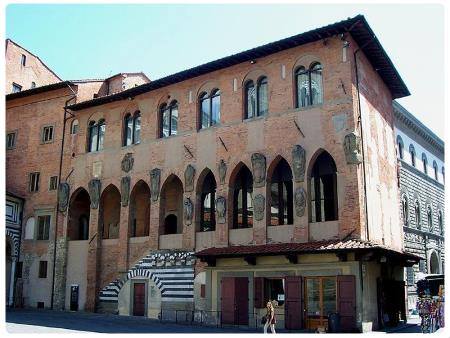|
You are here:
What to see in Pistoia
>
Bishops' Palace
in Pistoia
|
For almost
eight centuries, and until 1782, this was the
residence of the bishops of Pistoia. In 1786 it was
sold to private individuals, thus beginning a period
of profound transformation. It was only in 1980 that
the palace, following a complex restoration project,
acquired a new value of testimony. The traces of the
numerous interventions that have taken place over
the centuries are made evident and new exhibition
spaces are equipped. Thus the entire volume of the
Sacristy is retrieved, which saw the sacrilegious
theft of Vanni Fucci, remembered by Dante
(Inferno, XXIV, 138). |
|
 The
Bishops' Palace is located next to the Cathedral of San Zeno,
built in the 11th century between the ancient Via Regia (currently Via della
Torre) and Piazza del Duomo. It was built to provide a new dwelling for the
bishop and canonicals of the time, and it also benefited from the presence
of Emperor Frederick Barbarossa, who arrived in Pistoia on the
occasion of the investiture of Bishop Rainaldo. The medieval features
of the palace are still strongly present, although it was once characterized
by a strong fortified structure, crenellated, and with a corner tower, which
was then less and less apparent. Today the appearance is that of an elegant
and elegant structure, characterized by elements that exclude the past of an
almost fortress, probably only recognizable in the back of the palace. The
Bishops' Palace is located next to the Cathedral of San Zeno,
built in the 11th century between the ancient Via Regia (currently Via della
Torre) and Piazza del Duomo. It was built to provide a new dwelling for the
bishop and canonicals of the time, and it also benefited from the presence
of Emperor Frederick Barbarossa, who arrived in Pistoia on the
occasion of the investiture of Bishop Rainaldo. The medieval features
of the palace are still strongly present, although it was once characterized
by a strong fortified structure, crenellated, and with a corner tower, which
was then less and less apparent. Today the appearance is that of an elegant
and elegant structure, characterized by elements that exclude the past of an
almost fortress, probably only recognizable in the back of the palace.
Over time the palace has undergone few transformations, until its function
was replaced by the new Palazzo dei Vescovi in Via Puccini, built in
the eighteenth century by Bishop Scipione de' Ricci. The ancient
palace was in the meantime entrusted as a private dwelling, until the
restoration by the Cassa di Risparmio di Pistoia e Pescia returned the
past architectural vogue. The inside of the Palazzo dei Vescovi is now the
seat of the bank branch, which is also its owner, of the A. P. T., and of
the Chapter Museum where the sacred objects of the Cathedral are
housed, including liturgical furnishings and jewellery.
You will notice the expositions of a Crucifixion by Giovanni Cristiani,
the reliquary of San Zeno, the chalice and the cross of Saint Act.
Just a little further on, in the section of the Old Sacristy we find the
reliquary of San Jacopo, by Lorenzo Ghiberti; here there was also
the treasure of San Jacopo, which was the object of the famous theft of
Vanni Fucci, also remembered by Dante in the Divine Comedy. The interior
of the Palazzo dei Vescovi is also appreciated for the chapel of San
Niccolò, located in the upper part, which houses a cycle of frescoes
from the thirteenth century.
Where is it located?
Top
Ostelli Pistoia
Ostelli Italia
Auberges de Jeunesse Italie
Carte de Pistoia
Karte von Pistoia
Mapa Pistoia
Map of Pistoia
Carte de la Toscane Karte von Toskana Mapa Toscana Map of Tuscany
Carte d'Italie
Karte von Italien Mapa Italia Map of Italy |